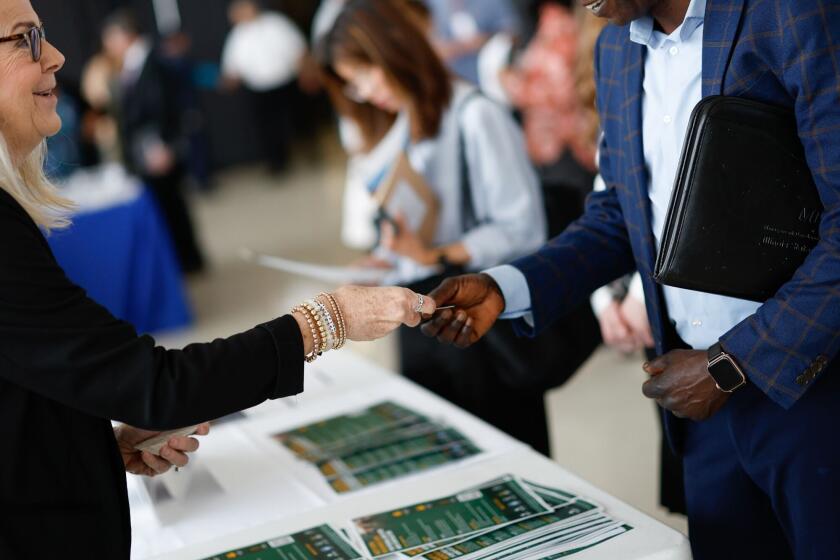U.S. Firms Try to Mine Japan Investor Riches
- Share via
TOKYO — Kikuko Uemura, a 31-year-old office manager, was sick of earning a paltry 0.25% interest on her savings--meaning that $20,000 socked away in a bank account delivered a mere $50 a year, enough for a moderate sushi dinner for one.
The swooning Japanese stock market offered little alternative appeal, with the Nikkei index worth less than half its 1989 high.
Disgusted, Uemura looked for better-performing foreign alternatives for her money. First, she put $20,000 into U.S. Treasury bills, thrilled by a 6% annual return. Emboldened, she plunked $5,000 more into a Fidelity global mutual fund that invests in European stocks.
“Nothing is really working here in Japan,” Uemura said with a sigh. “The choice was obvious.”
Fidelity Investments; Merrill Lynch & Co.; Goldman, Sachs & Co.; and other investment firms are hoping that the choice will be obvious to other Japanese too. The U.S. firms are mounting huge offensives in Japan as they try to woo into mutual funds even a sliver of the world’s largest savings stash--$9.2 trillion--which now languishes in Japanese savings accounts. To put it in some perspective, Fidelity, the world’s largest mutual fund operator, now manages about $700 billion in worldwide assets.
Spurring the interest in foreign funds is the huge amount of publicity surrounding the country’s “Big Bang” financial deregulation last month. Among other reforms, it allowed foreign mutual fund firms to sell their services directly to the Japanese public. For the last two years, Boston-based Fidelity had been selling funds through Japan’s largest securities firms and also began selling them at kiosks at three major banks.
Success could have significant implications for both Japan and the world’s financial markets. The Daily Yomiuri newspaper compared the foreign investment firms to a “black ship” breaking “Japan’s financial isolation period,” alluding to Commodore Matthew Perry’s opening of Japanese ports in the 1850s.
Still, getting Japanese to switch out of their trusted savings accounts--and accept some risk on their investments--is no slam dunk. Despite the low-yielding Japanese alternatives and contrasting stellar performance of the Dow Jones industrial average, for example, foreign mutual funds and stocks remain the underdog in the world’s second-largest economy.
Young, savvy investors such as Uemura may be game to try something new, but the people with most of the money in Japan--their parents and grandparents--still prefer cash. To many, investing in the market is tantamount to gambling. Making matters more complex is a ricocheting yen/dollar exchange rate that can easily wipe out gains.
Uemura’s parents say they think their daughter is nuts to risk her money abroad. Much of the hefty sum they’ve saved over the years from their construction business and real estate ventures is parked in the huge Japanese postal savings system.
“My husband always says, ‘The money you get without actually working will eventually disappear,’ ” said Kikuko’s mother, Kyoko. “All I can do is work and save.”
The conflicting values of mother and daughter tell a great deal about how Japanese differ from Americans when it comes to making money on money. For Americans, investing in stocks and mutual funds has become nearly as common as using a credit card and as simple as calling an 800 number.
While Americans keep about 19% of their personal financial assets in savings, checking and certificates of deposit, they invest almost double the sum--36%--in stocks and mutual funds. Not so in Japan. The Japanese hold 63% of their personal financial assets in banks or CD accounts. They invest just 12% in securities, according to the Bank of Japan.
Consider Matsutaro Fukase, 64, a retired construction executive. Earning less than 0.5% interest on savings “is the worst,” he lamented. “Putting money in an account just doesn’t do any good. Maybe it’s OK for those with jobs, but how about pensioners?”
Nevertheless, Fukase keeps nearly $300,000 in the postal savings system, too scared to do anything else with it. “I know there are so many foreign institutions coming. I’m considering it, but I think because it’s in U.S. dollars, there’s too much [currency] risk.”
Japan has hardly encouraged individual investors. Until recently, the grandmothers of the Beardstown Ladies investment club would have been criminals if they were Japanese. Although regulators recently lifted their outright ban on investment clubs, they still restrict pools to 20 and limit their investments to about $75 each per month. Japan also does not permit corporations to offer 401(k) retirement plans, which have helped propel the U.S. stock market and inspired interest among individuals.
Moreover, Japanese investors have been burned in the past--the Nikkei index has been on a nine-year free fall.
“We all have a hangover from the bad experience,” said Hiroshi Arimoto, 64.
Numerous scandals at Japanese brokerage firms also have tarnished brokers’ reputations. Said Mitsuko Yanai, who runs a billion-dollar cement company and recently helped found the Japan Assn. for Individual Investors: “The sales people at securities firms are all liars with quotas. They sell anything.”
And Japanese shareholders have little or no voice in the operations of publicly traded Japanese corporations, which disclose few details about their operations compared to their U.S. counterparts.
The Japanese have been motivated primarily by the safe return of their principal rather than big gains, said Toyohiko Watanabe, general manager of Nomura Securities’ investment trust division. “They didn’t consider opportunity loss. If they get back their principal and they get no profit, that’s a loss.”
Indeed, risk has for the most part been anathema to homemakers, who control the household purse strings in Japan. One reason: They don’t feel the money is theirs to spend but instead is the husband’s or the household’s.
“Women hold on to it so tightly and are really into saving it,” said Yanai, who runs the shareholders’ association. “Japan is an island, so it’s isolated. They’re always more interested in protecting themselves than expanding their assets.”
Even some executives at Japanese securities firms have a tough time convincing their own wives of the merits of investing.
Koji Tanaka, the deputy public relations manager at Nikko Securities Co., says he and his wife fight over how to use his paycheck: She wants to deposit it in the postal savings system, while he wants to invest it in mutual funds. “I try to protect my money because we are still young and can take risk,” said Tanaka, who is 39.
Donna Morris, senior vice president of Fidelity Brokerage Services in Japan, compares Japan to the U.S. 20 years ago.
“In the early 1980s,” she said, “Americans started thinking [that] they’re not going to be able to rely on Social Security or the notion of lifetime employment and began taking responsibility for their kids’ educations and retirement.”
Now people such as Yanai are helping to spur change. She has started an investors’ group known as the Rabbit Club and is hoping to start several others that will consider foreign investments.
Yanai herself hasn’t decided whether to buy any foreign funds. For now, she prefers bottom-fishing in the Japanese stock market. Nevertheless, she’s thrilled that the foreign investment firms are here, saying, “I hope they learn to speak our language and change our perceptions about investment.”
More to Read
Inside the business of entertainment
The Wide Shot brings you news, analysis and insights on everything from streaming wars to production — and what it all means for the future.
You may occasionally receive promotional content from the Los Angeles Times.










